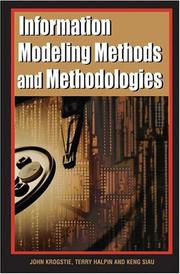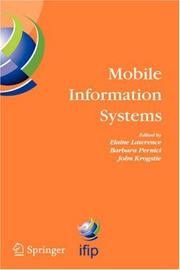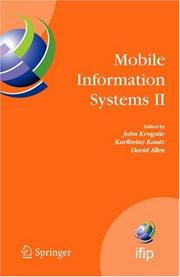| Listing 1 - 7 of 7 |
Sort by
|

ISBN: 1591403758 1591403766 1591403774 Year: 2005 Publisher: Hershey, (Pa.) : Idea group publishing,
Abstract | Keywords | Export | Availability | Bookmark
 Loading...
Loading...Choose an application
- Reference Manager
- EndNote
- RefWorks (Direct export to RefWorks)
Digital
ISBN: 9780387228747 Year: 2005 Publisher: Boston, MA International Federation for Information Processing
Abstract | Keywords | Export | Availability | Bookmark
 Loading...
Loading...Choose an application
- Reference Manager
- EndNote
- RefWorks (Direct export to RefWorks)
Distribution strategy --- Information systems --- Computer. Automation --- ICT (informatie- en communicatietechnieken) --- informatiesystemen --- e-commerce
Digital
ISBN: 9780387311661 Year: 2005 Publisher: Boston, MA International Federation for Information Processing
Abstract | Keywords | Export | Availability | Bookmark
 Loading...
Loading...Choose an application
- Reference Manager
- EndNote
- RefWorks (Direct export to RefWorks)
Distribution strategy --- Computer architecture. Operating systems --- Information systems --- Computer. Automation --- ICT (informatie- en communicatietechnieken) --- informatica --- computerbesturingssystemen --- informatiesystemen --- e-commerce --- OS (operating system) --- computernetwerken
Book
ISBN: 9780387228747 Year: 2005 Publisher: Boston MA Springer US
Abstract | Keywords | Export | Availability | Bookmark
 Loading...
Loading...Choose an application
- Reference Manager
- EndNote
- RefWorks (Direct export to RefWorks)
Mobile Information Systems Edited by Elaine Lawrence, Barbara Pernici, John Krogstie Mobility is perhaps the most important market and technological trend within information and communication technology. With the advent of new mobile infrastructures providing higher bandwidth and constant connection to the network from virtually everywhere, the way people use information resources is predicted to be radically transformed. The rapid developments in information technology (IT), particularly communication and collaboration technologies, are substantially changing the landscape of organizational computing. Workers in any business area are becoming increasingly mobile. Workers in an increasing number of areas will be required to act flexibly within the constraints of the business processes of the company (or companies) for which they are currently working. At the same time they will often want to use the same information technology to support their private tasks. Over the last years, a new breed of information systems has appeared to address this emerging situation, referred to as mCommerce systems or mobile information systems. This book contains the proceedings of the IFIP TC8 Working Conference on Mobile Information Systems, which was held in September 2004 in Oslo, Norway and sponsored by the International Federation for Information Processing (IFIP). Mobile Information Systems aims to: Clarify differences and similarities between the development of mobile vs. more traditional information system. Investigate the organizational impact of mobile information systems Investigate mCommerce relative to eCommerce Investigate mobile commerce applications combined with the advantages of mobile communications technologies, the drivers of which have been identified as ubiquity, reachability, security, convenience, localization, instant connectivity and personalization. Evaluate existing and newly developed approaches for analysis, design, implementation, and evolution of mobile information systems. Investigate technical issues and the constraints they pose on mobile information systems functionalities and design
Distribution strategy --- Information systems --- Computer. Automation --- ICT (informatie- en communicatietechnieken) --- informatiesystemen --- e-commerce
Book
ISBN: 9780387311661 Year: 2005 Publisher: Boston MA Springer US
Abstract | Keywords | Export | Availability | Bookmark
 Loading...
Loading...Choose an application
- Reference Manager
- EndNote
- RefWorks (Direct export to RefWorks)
Mobility is perhaps the most important market and technological trend within information and communication technology. With the advent of new mobile infrastructures providing high bandwidth and constant connection to the network from virtually everywhere, the way people use information resources for work and leisure is being radically transformed. The rapid developments in information technology, particularly communication and collaboration technologies, are substantially changing the landscape of organizational computing. Workers in any business area are becoming increasingly mobile. Workers in more and more areas will be required to act flexibly within the constraints of the business processes of the company (or companies) they are currently working for. At the same time they will often want to use the same information technology to support their private tasks. Over the last years, a new breed of information systems has appeared to address this emerging situation, referred to as mobile information systems. Specific applications are also being characterized as, among others, m-Commerce, m-Learning, and m-Business. This book contains the proceedings of the second IFIP TC8 Working Conference on Mobile Information Systems which was held in December 2005 in Leeds, UK and sponsored by the International Federation of Information Processing (IFIP). Mobile Information Systems II aims to: · Clarify differences and similarities between the development of mobile and more traditional information systems. · Investigate the organizational impact of mobile information systems. · Investigate the 'e to m shift' , for example in m-Commerce relative to e-Commerce. · Investigate mobile commerce applications combined with the advantages of mobile communications technologies, the drivers of which have been identified as ubiquity, accessibility, security, convenience, localization, instant connectivity, and personalization. · Evaluate existing and newly developed approaches for the analysis, design, implementation, and evolution of mobile information systems. · Investigate technical issues and the constraints they impose on mobile information systems functionalities and design.
Distribution strategy --- Computer architecture. Operating systems --- Information systems --- Computer. Automation --- ICT (informatie- en communicatietechnieken) --- informatica --- computerbesturingssystemen --- informatiesystemen --- e-commerce --- OS (operating system) --- computernetwerken

ISBN: 1280609109 9786610609109 0387228748 0387228519 Year: 2005 Publisher: New York, New York : Springer,
Abstract | Keywords | Export | Availability | Bookmark
 Loading...
Loading...Choose an application
- Reference Manager
- EndNote
- RefWorks (Direct export to RefWorks)
Mobile Information Systems Edited by Elaine Lawrence, Barbara Pernici, John Krogstie Mobility is perhaps the most important market and technological trend within information and communication technology. With the advent of new mobile infrastructures providing higher bandwidth and constant connection to the network from virtually everywhere, the way people use information resources is predicted to be radically transformed. The rapid developments in information technology (IT), particularly communication and collaboration technologies, are substantially changing the landscape of organizational computing. Workers in any business area are becoming increasingly mobile. Workers in an increasing number of areas will be required to act flexibly within the constraints of the business processes of the company (or companies) for which they are currently working. At the same time they will often want to use the same information technology to support their private tasks. Over the last years, a new breed of information systems has appeared to address this emerging situation, referred to as mCommerce systems or mobile information systems. This book contains the proceedings of the IFIP TC8 Working Conference on Mobile Information Systems, which was held in September 2004 in Oslo, Norway and sponsored by the International Federation for Information Processing (IFIP). Mobile Information Systems aims to: Clarify differences and similarities between the development of mobile vs. more traditional information system. Investigate the organizational impact of mobile information systems Investigate mCommerce relative to eCommerce Investigate mobile commerce applications combined with the advantages of mobile communications technologies, the drivers of which have been identified as ubiquity, reachability, security, convenience, localization, instant connectivity and personalization. Evaluate existing and newly developed approaches for analysis, design, implementation, and evolution of mobile information systems. Investigate technical issues and the constraints they pose on mobile information systems functionalities and design.
Mobile computing --- Electronic data processing --- Computer Communication Networks. --- Information systems. --- Information Systems Applications (incl. Internet). --- Information Systems and Communication Service. --- e-Commerce/e-business. --- Computer communication systems. --- Application software. --- Computers. --- E-commerce. --- Cybercommerce --- E-business --- E-commerce --- E-tailing --- eBusiness --- eCommerce --- Electronic business --- Internet commerce --- Internet retailing --- Online commerce --- Web retailing --- Commerce --- Information superhighway --- Automatic computers --- Automatic data processors --- Computer hardware --- Computing machines (Computers) --- Electronic brains --- Electronic calculating-machines --- Electronic computers --- Hardware, Computer --- Computer systems --- Cybernetics --- Machine theory --- Calculators --- Cyberspace --- Application computer programs --- Application computer software --- Applications software --- Apps (Computer software) --- Computer software --- Communication systems, Computer --- Computer communication systems --- Data networks, Computer --- ECNs (Electronic communication networks) --- Electronic communication networks --- Networks, Computer --- Teleprocessing networks --- Data transmission systems --- Digital communications --- Electronic systems --- Information networks --- Telecommunication --- Cyberinfrastructure --- Network computers --- Distributed processing

ISBN: 9780387295510 0387295518 9786610616671 1280616679 0387311661 Year: 2005 Publisher: New York, New York : Springer,
Abstract | Keywords | Export | Availability | Bookmark
 Loading...
Loading...Choose an application
- Reference Manager
- EndNote
- RefWorks (Direct export to RefWorks)
Mobility is perhaps the most important market and technological trend within information and communication technology. With the advent of new mobile infrastructures providing high bandwidth and constant connection to the network from virtually everywhere, the way people use information resources for work and leisure is being radically transformed. The rapid developments in information technology, particularly communication and collaboration technologies, are substantially changing the landscape of organizational computing. Workers in any business area are becoming increasingly mobile. Workers in more and more areas will be required to act flexibly within the constraints of the business processes of the company (or companies) they are currently working for. At the same time they will often want to use the same information technology to support their private tasks. Over the last years, a new breed of information systems has appeared to address this emerging situation, referred to as mobile information systems. Specific applications are also being characterized as, among others, m-Commerce, m-Learning, and m-Business. This book contains the proceedings of the second IFIP TC8 Working Conference on Mobile Information Systems which was held in December 2005 in Leeds, UK and sponsored by the International Federation of Information Processing (IFIP). Mobile Information Systems II aims to: · Clarify differences and similarities between the development of mobile and more traditional information systems. · Investigate the organizational impact of mobile information systems. · Investigate the 'e to m shift' , for example in m-Commerce relative to e-Commerce. · Investigate mobile commerce applications combined with the advantages of mobile communications technologies, the drivers of which have been identified as ubiquity, accessibility, security, convenience, localization, instant connectivity, and personalization. · Evaluate existing and newly developed approaches for the analysis, design, implementation, and evolution of mobile information systems. · Investigate technical issues and the constraints they impose on mobile information systems functionalities and design.
Mobile computing --- Mobile communication systems --- Mobile commerce --- Informatique mobile --- Radiocommunications mobiles --- Commerce mobile --- Congresses --- Congrès --- Electronic books. -- local. --- Mobile commerce -- Congresses. --- Mobile communication systems -- Congresses. --- Mobile computing -- Congresses. --- Engineering & Applied Sciences --- Computer Science --- M-business --- M-commerce --- Mobile business --- Mobile payments --- Computer science. --- Computer organization. --- Computer communication systems. --- Computers. --- E-commerce. --- Computer Science. --- Computer Communication Networks. --- Information Systems and Communication Service. --- e-Commerce/e-business. --- Computer Systems Organization and Communication Networks. --- Computer Science, general. --- Cybercommerce --- E-business --- E-commerce --- E-tailing --- eBusiness --- eCommerce --- Electronic business --- Internet commerce --- Internet retailing --- Online commerce --- Web retailing --- Commerce --- Information superhighway --- Automatic computers --- Automatic data processors --- Computer hardware --- Computing machines (Computers) --- Electronic brains --- Electronic calculating-machines --- Electronic computers --- Hardware, Computer --- Computer systems --- Cybernetics --- Machine theory --- Calculators --- Cyberspace --- Communication systems, Computer --- Computer communication systems --- Data networks, Computer --- ECNs (Electronic communication networks) --- Electronic communication networks --- Networks, Computer --- Teleprocessing networks --- Data transmission systems --- Digital communications --- Electronic systems --- Information networks --- Telecommunication --- Cyberinfrastructure --- Electronic data processing --- Network computers --- Organization, Computer --- Electronic digital computers --- Informatics --- Science --- Distributed processing --- Electronic commerce --- Electronic funds transfers --- Information systems. --- Computer network architectures. --- Architectures, Computer network --- Network architectures, Computer --- Computer architecture
| Listing 1 - 7 of 7 |
Sort by
|

 Search
Search Feedback
Feedback About UniCat
About UniCat  Help
Help News
News